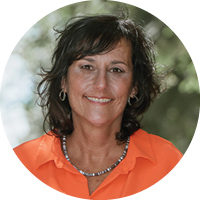



About

IN EVERY ISSUE
1.
PRESIDENT'S MESSAGE
Why Cultivating Value Matters

2.
Publisher's Message
Creativity, Authenticity, and the Power of Standing Out

3.
FROM THE EDITOR
Welcome to the January/February 2025 Issue of the Marketer

Calendar of Events
4.

Curiosity may be the most underrated and overlooked skill in life.
In elementary school in New Jersey, my sisters' teachers wrote on their report cards: Talks too much in class. My teachers wrote: Roams around the hallways. I escaped my third-grade classroom, thinking there was something more interesting to discover in the fifth-grade wing, lunchroom, or library.
In 1970, I was drawing peace signs when the Vietnam War ended. We used the class record player at lunch to listen to Jesus Christ Superstar, which was on Broadway. The principal told my parents I was "too concerned with the outside world" and firmly told me to stay in my classroom.
Sadly, no one was impressed with my sense of wonderment. There was no talk about experiential learning. And, no, I don't have attention disorders.
Years later, I earned my degree in Mass Communication. I had a passion for broadcast news and a love of writing. I also knew being tethered to a desk wasn't for me. I worked for 10 years as a radio news reporter, on-air anchor, and news director.
Finding Commonalities and Building Connections
In chaotic newsrooms, hastily planned press conferences and breaking news made my job fascinating. The fuel driving my 40-year career in communications, including 25 in A/E/C, is still my innate curiosity.
I’ve learned that A/E/C business developers, marketers, project managers, proposal writers, and other communications professionals are very similar to reporters.
To excel at work, we must:
- Know the audience
- Find new angles to stand out
- Be timely, relevant, and compelling
- Prepare for interviews
- Break down complex information
- Engage people quickly
- Have an impact on people and communities
It is imperative that you know the real challenges of the people you're communicating with.
Marketers and business development professionals feel more confident and prepared for shortlist interviews when they know who will be there and why. It is critical that you know the real challenges of the people you're communicating with. Above all, your team must understand their role in every client meeting. Shortcuts don't close shortlisted interviews.

Knowing your audience isn't limited to interviews and presentations.
Proposal writers must have the right words and order, making it easy for decision-makers to consume your RFPs. Hook them from the beginning and capture their attention with compelling, relatable, and timely information that flows seamlessly.
Though many doers in A/E/C aren't skilled writers, as an A/E/C marketer, you can use your communication skills to teach them how to break down complex data into clear, simple sound bites, which you can make engaging.
It's time to burn the cookie-cutter templates and stale scripts.
For example, much like A/B social media campaigns, one radio station I worked in had two different stations broadcasting from the same building.
There was an AM oldies music station playing Frank Sinatra and The Chiffons. Listeners were 55 and older and wanted to know about tax hikes and engineering studies for a proposed mall. We delivered 15-minute news blocks in the mornings and afternoons, plus hourly updates.
The FM station played rock music for a younger audience that preferred Van Halen and Blondie. They cared about major national headlines, a huge traffic pile-up, and a fun "kicker" story. We delivered 90-second updates in morning and afternoon drivetime.
Occasionally, the same stories were a good fit for both demographics. However, my staff was always tweaking words and simplifying information to impact our different audiences. Segmentation is a time-tested approach.
Keep it Compelling
The benefit of working in broadcasting was that I was paid to be curious, ask good questions, find intriguing angles, and write concise stories. I interviewed everyone from homeless people to presidents and won awards along the way.
And I discovered the ease of making small talk. Knowing about the winner of the Masters golf tournament or a tsunami in Thailand brought me out of my shell. Keeping up with industry twists, turns, and trends helps build confidence.
After years in frenzied newsrooms in the most competitive media market in the U.S. (New Jersey, New York, and Philadelphia), I went on to co-manage the Office of Radio and Television for New Jersey Gov. Christine Todd Whitman. At the New Jersey State House, my hectic pace continued as I ran a "news department" for the Governor.
I watched and listened to other reporters interview Whitman at hundreds of press conferences and news events. Like me, curious journalists from print, radio, and TV outlets (pre-social media) searched for a story to scoop the competition. They paid close attention to nuances and tidbits so their stories would stand out from competitors.

In A/E/C, getting to the guts of the story creates differentiation.”
Pivoting and Perfectionism
At impromptu press conferences, Gov. Whitman would field questions on various topics. Some were unpredictable. The Governor could pivot on a dime, and if she occasionally didn't know the answer, Whitman would candidly respond: "I don't know, but I'll find out and get back to you by the end of the day." Her aide made a note and kept their word.
Astute A/E/C professionals must gracefully adapt as well. Those who believe they must answer every question immediately often have imposter syndrome with underlying self-doubt.
Based on my deep journalism experience, I train A/E/C professionals how to embrace curiosity and overcome self-doubt. I teach them how to be comfortable being perfectly imperfect.
Curiosity and Quality Questions
If you've spent time with young children, you know the wonder—and frustration—of how they can fire off dozens of questions in 30 seconds. Their eagerness to learn can be frustrating or fun to watch.
I remember when our son Danny was eight years old. He would bounce out of bed on a summer morning, find his friend Jacob, and jump on their bikes, searching for "interesting things." They had no idea what they were looking for, but they were sure something fantastic was waiting. They always asked: "I wonder where we'll find fun today?" Danny, now 29, is an attorney. His habit of digging around remains his superpower.
In A/E/C, curious leaders ask quality questions, gather quality information, and are more creative. If you need better information, ask better questions. The onus is on you, not your audience. Consider yourself an emotional archaeologist. You have an invisible shovel and dig into a challenge to uncover a striking angle other firms overlook. You find what's missing. In A/E/C, getting to the guts of the story creates differentiation.
Skillful business development professionals and marketers don't interrogate people. They simply pose different kinds of questions, inviting others to reveal their real problems and desires.
2 Key Questions for Preparing Proposals and Shortlisted Interviews
Reporters and A/E/C professionals worth their salt ask themselves critical questions to uncover fresh hooks and angles. Guessing in business is very expensive.
Who cares??
I would receive dozens of news pitches and "great" story ideas on any given day. Most were not newsworthy or relevant to my audience. As soon as I heard or read a pitch, my first thought was: "Who cares; why should I cover your story???" You may think this is brusque. Still, local reporters at a weekly newspaper in Seattle and top producers in New York City have the same mindset. How will this story and information impact my audience? Your response is the litmus test for what stays or goes in a presentation or RFP.
What else, what else, what else?
Emotional archaeologists—and thoughtful reporters—pay attention differently. They explore underneath the obvious and get to the heart of an issue. They're always asking: "What else can this be about that I haven't figured out yet? Where is the hidden gem that's relevant, timely, and compelling right now?" They peel back the layers to expose the juicy part that competitors miss.
The Power of Listening
There is an essential follow-up to asking quality questions and probing. You must give people the gift of your attention. The timeless technique I teach and use is Silent Listening. It's beyond active listening and repeating someone else's name. It’s also an anagram; the same letters in a different order.
Silent listening means you shut down the internal chatter and are truly present in every conversation, whether you're at the dry cleaner or a conference. When you silence your mind and learn the brain science behind effective communication, it's easy to build consensus. The key is being attentive, asking thoughtful questions, and listening for the nuances.
Silent listening is like meditation and yoga. You shut down the chaos from our busy, distracted world, forming deeper relationships, professionally and personally. Those who use Silent Listening aren't mentally drifting, thinking the car needs gas or the dog has to be fed. When you pay attention differently, you magnetize opportunities.
Deep listeners can pull themselves back into the moment to be fully present. Self-awareness helps master this technique, sparking creativity, confidence, and critical thinking skills. You are in the moment, and it's crystal clear as you offer meaningful solutions in RFPs, proposals, and presentations that others overlook.
Graduates of my training programs become more confident communicators with critical thinking skills because they connect the dots for prospects and clients. If there is confusion, you get zero connection.
A/E/C teams with sustainable growth trust themselves because they've done their homework and are exceptional problem solvers. It's all about B.S.—Be the Solution.
Curious people who ask quality questions and use Silent Listening aren't simply consultants who offer value to projects. The differentiator is you become a respected advisor, bringing IMMENSE value in a subtle, humble way that attracts lasting connections and repeat clients.
You don't depend on cookie-cutter templates and old scripts; you trust yourself and your team.
Knowing Your Audience—and Yourself
Like experienced reporters, you must identify your audience's interests and challenges. You prepare by knowing what to include and leave out of presentations, proposals, and meetings. Paying attention to detail is empowering and impactful because people are buying you. They have enough data; you are the message.
I've learned that the most important communication is the communication we have with ourselves. Our internal narrative determines our success. Do you need to improve your vocal delivery and body language? Are you showing up with humility and confidence, or imposter syndrome and negative self-talk?
I’ve learned that the most important communication is the communication we have with ourselves.”
Those willing to first do the inner work to shut down negative self-talk communicate with charisma and boldness. You'll be more engaging and self-assured with an open mind and heart.
No one needs more data or technology. We need timeless human-to-human connections to foster growth and relationships.
Susan Young, CEO of Get in Front Communications, is an award-winning communicator, keynote speaker, and entrepreneur with 40 years of experience. She has been called the “communications rock star for tech nerds in A/E/C.” Susan works with professionals who want to be confident communicators so they have more trust, impact, and clients. A former radio news reporter, anchor and publicist, Susan has interviewed everyone from homeless people to presidents. Graduates of her Top Tier Communicator program call the training invaluable as they overcome negative self-talk with repeatable processes that blend brain science and business development that grow people and profits.
Connect on Linkedin










